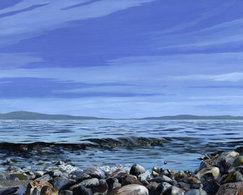It was also apparent that loneliness was one of the biggest roadblocks to people becoming sober, too. Many men and women we worked with had long histories of alcoholism, and were also desperate, time and again, to become sober. We saw people go to multiple detox centers, treatment facilities, and support groups. Once they became sober, local social work agencies would support them in finding housing, as many were homeless before they entered treatment.
However, housing and detox often wasn’t enough to help many people stay sober. For a lot of people I met working at Oasis, alcohol had become a dependable friend – there to take the edge off loneliness and painful emotions. Often there were also complex and intergenerational factors: many people’s parents had or were struggling with addiction themselves, had suffered serious traumas, and encountered social and economic barriers to becoming well again. Many influences were in play.
However, ultimately, what we saw as the most important success indicator in people becoming and staying sober was human heart-connection. In this life journey, we need each other. We need something larger than ourselves, however we come to understand this.
Although I don't suffer from addiction to alcohol or drugs, I also struggle with unhealthy coping mechanisms. I also need human heart-connection and a sense of belonging to something larger than myself to feel well and centred in myself.
Whether we are housed or un-housed, sober or not, seeing beauty within ourselves, others, and in life around us brings us to life.
One day at Oasis I’d had a particularly rough day. I'd heard and worked with life stories that contained so much suffering, and I felt under the weight of not knowing how to make sense of it all. I felt in a dark place myself.
Margaret gave me some advice that day that, many years later, I still hold dear. She said, “whenever you’ve witnessed great pain and suffering, make sure to also witness something beautiful before the end of the day.”
The world contains much pain, and also much beauty. Sometimes in the thick of it we can feel weighed down and heavy by either witnessing pain in others, in our planet, or experiencing it directly ourselves. What Margaret was talking about is our great power to turn our attention towards the beauty in life. Each of us has the incredible ability to shift our inner state to holding not just challenge, but also the immense beauty that, in large and small ways, is everywhere.
If you’re feeling a sense of heaviness in this moment – or at some point in the future – I encourage you to try this. You can ask yourself, “where is there beauty around me?” And if that feels challenging, you can even say – as an intention or prayer – “May I see beauty around me.”
In Victoria I lived by the ocean and would often go for long cleansing walks along the rocks at the end of the day. Some of the beauty I’d regularly see would be seals playing, crashing waves, families of mussels clinging to the rocky shoreline.
Now that I live in a city and don’t always have time to get into nature, my sense of finding beauty through this practice has become subtler, and perhaps more accessible, too. Taking a moment to pause and watch steam rising from my tea, asking a friend or loved one for a hug, giving myself a massage, even reading a favourite poem.
No matter the circumstances of our lives, we can always shift our attention in small ways towards what is good.
Things do not need to be grand, or even objectively celebrated, in order to bring the comfort and the energy of beauty into our lives. Beauty is always available to us, however subtle it’s glimmer may be. When we pay attention to this, we have the opportunity to watch it grow.
May we recognize the beauty that surrounds and fills us - in all the big and small ways it presents itself.
PS. The Oasis Society for Spiritual Health is an incredible grassroots organization and relies on donations to do its good work. If you’re wondering how to share your abundance with those in need, please consider making a donation to them.

 RSS Feed
RSS Feed